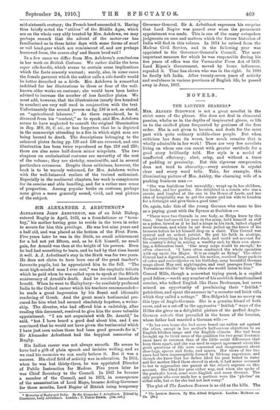SIR ALEXANDER J. ARBUTHNOT.*
ALEXANDER JOHN ARBUTHNOT, son of an Irish Bishop, entered Rugby in April, 1832, as a foundationer or " town- boy," his mother having gone to reside in the town in order to secure for him this privilege. He was but nine years and a half old, and was placed at the bottom of the First Form. Five years later he was in the Sixth, no small achievement for a lad not yet fifteen, and, as he felt himself, no small gain, for Arnold was then at the height of his powers. Even he had had something to learn, and be had by that time learnt it well. A. J. Arbuthnot's stay in the Sixth was for two years. He does not claim to have been one of the great teacher's favourite pupils, but he appreciated him to the full. "The most high-minded man I ever met," was the emphatic tribute which he paid when he was called upon to speak at the fiftieth anniversary of Arnold's death. And be received immediate benefit. When he went to Haileybm.y—he resolutely preferred India to the Oxford career which his teachers recommended— he made a great impression by his fluent and idiomatic rendering of Greek. And the great man's testimonial pro- cured for him what had seemed absolutely hopeless, a writer- ship. The director, who had offered him a cadetship, after reading this document, resolved to give him the more valuable appointment. " I am not acquainted with Dr. Arnold," he said, " but I have heard a good deal about him, and I am convinced that he would not have given the testimonial which I have just seen unless there had been good grounds for it." Sir Alexander Arbuthnot had the happiest memories of Rugby.
His Indian career was not always smooth. He seems to have had a gift of plain speech and incisive writing, and as we read his memoirs we can easily believe it. But it was a success. His chief field of activity was in education. In 1855, when he was but thirty-three, he was appointed Director of Public Instruction for Madras. Five years later he was Chief Secretary to the CounciL In 1867 he became a member of the Council, and in 1872, in consequence of the assassination of Lord Mayo, became Acting-Governor for three months, Lord Napier of Ettrick being temporary
• Memories of Rugby and India. By Sir Alexander J. Arbuthnot. Edited by Constance, Lady Arbuthnot. London: T. Fisher Unwin. [15e. net.]
Governor-General. Sir A. Arbuthnot expresses his surprise that Lord Napier was passed over when the permanent appointment was made. This is one of the many outspoken judgments on men and matters which the future historian of India will find in this volume. In 1874 he retired from the Madras Civil Service, and in the following year was appointed to the Governor-General's Council. The next important measure for which he was responsible during his five years of office was the Vernacular Press Act of 1878. Lord Ripon's Government, moved by home influences, repealed it. Time has shown who was in the right. In 1880 he finally left India. After twenty-seven years of activity and usefulness in various provinces of English life, he passed away in June, 1907.










































 Previous page
Previous page